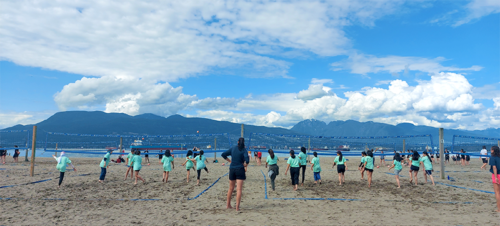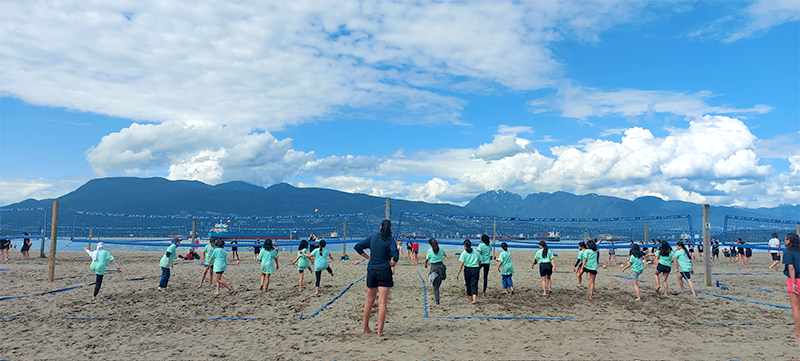Case Study: Implementing Equitable and Quality Community Sport for Racialized and Newcomer Women & Girls Project
 Positive experiences in supportive environments are at the core of quality sport—we need welcoming, progressive, fun sport and physical activity to keep everyone engaged and active for life. As we all look to build a more equitable and inclusive future, that goal has never been more important.
Positive experiences in supportive environments are at the core of quality sport—we need welcoming, progressive, fun sport and physical activity to keep everyone engaged and active for life. As we all look to build a more equitable and inclusive future, that goal has never been more important.
Gender equity plays a pivotal role in that positive, welcoming experience.
This past year, Sport for Life, in partnership with Canadian Women & Sport, took on a new initiative to support and collaborate with community-based organizations keen to engage and empower self-identifying racialized and/or newcomer women, girls, trans women, trans girls, and femmes through quality sport opportunities.
“This project gave us the opportunity to pilot a different approach to supporting community sport organizations in implementing equitable quality sport programs—one that combined flexible funding and ongoing mentorship. Not only did we learn an immense amount from each other, but the connections we’ve made with one another were so enjoyable,” Francesca Jackman, Manager of Strategic Initiatives at Sport for Life, said.
How did this initiative work? What were the learnings and takeaways? And what did we learn, to further newcomer and racialized women’s engagement in QS for the future?:
Concept
A pilot initiative in collaboration with Canadian Women & Sport, the project engaged three community-based organizations to implement quality sport (QS) programming that addresses barriers to the participation of racialized and/or newcomer women and girls in sport. This included:
- Designing and delivering QS programming
- Demonstrating the process and community impact of QS program implementation
- Developing legacy outputs to support the implementation of QS programming
To support their programming, the three organizations received S4L’s Quality Sport for Communities and Clubs resource, and Canadian Women & Sport’s She Belongs and Engaging Newcomer Girls and Women in Sport and Physical Activity resources.
As part of the initiative, S4L and Canadian Women & Sport reviewed one another’s resources and produced recommendations reports to support the refinement and development of supplementary materials including the Social Connection via Quality Sport checklist.
The three community-based groups also reviewed the resources and offered recommendations of tools and additional materials that would support local/community groups implementing QS programming that improves social connection opportunities for racialized/newcomer women/girls. In return, they received $8,000 to support their programming.
Monthly mentorship sessions were also established, bringing the groups together with representatives from S4L and Canadian Women & Sport to support the implementation of QS programming.
Selection of Communities
S4L and Canadian Women & Sport developed an application process, put out a call for community partnerships through their networks, hosted an information session for prospective partners and designed and used a matrix to evaluate applications and select three local sport/community-based organizations/groups to work with throughout the pilot.
Each of the three groups implemented QS programming throughout the spring and summer of 2022 for newcomer and/or racialized girls and women.
Implementation
The following three community-based organizations were selected for the project, and implemented the following programs for racialized and newcomer women and girls in their communities:
Caribbean Canadian Artistic Stars (CCAS)
CCAS is a community-based charitable organization infusing afro-Caribbean culture with sport, art and recreation to respond to the multifaceted needs of racialized and newcomer populations in Toronto. CCAS offers diverse sport, recreation and community engagement and mentorship programming.
For their program, CCAS offered a 4-week indoor soccer program for racialized and newcomer girls, and mentorship sessions with inspirational women involved in sport and physical activity. Participants learned new technical, social-emotional and life skills throughout.
Throughout the program, CCAS was also a successful recipient of a Jumpstart Community Development Grant to extend the program into outdoor Spring/Summer sessions.
Winnipeg Newcomer Sport Academy (WNSA)
WNSA is a community-based non-profit organization that delivers quality multi-sport programming to low-income newcomer families consistent with Long Term Development and True Sport Principles as a way to contribute to their positive integration in their new community.
The Academy offered a free “try-it” soccer session with the Manitoba Bisons for moms and daughters, and a free month-long dance program for newcomer girls and women. Participants learned different moves from different styles of dance, and were able to come up with their own dance by the last session.
South Vancouver Neighborhood House (SNVH) & Volleyball BC
SVNH is a community-based non-profit society that serves the community while ensuring services are accessible to residents who experience cultural, language, physical and, economic barriers. As a provincial sport governing body, Volleyball BC is dedicated to making volleyball accessible to all British Columbians and offers programs for athletes of all ages ranging from grassroots to high performance, as well as coaches and officials.
The collaborative program offered by SNVH and Volleyball BC was the SV Flare Volleyball Camp, which included four free 1.5-hour sessions to try beach volleyball, and a mentorship program with female coaches and officials to learn about other sport pathways. Participants learned technical, social-emotional and life skills, and enjoyed that the program was offered at the beach!
This initiative is a continuation of newcomer volleyball programming delivered in partnership between SVNH and Volleyball BC.
Evaluation & Learnings
Takeaways
There were five major takeaways from the pilot project:
- Accessible QS programs take time, and sustainable and flexible funding to deliver.
- Knowledge exchange about community-specific needs and sport/physical activity is a necessity to deliver impactful QS programming.
- Group forums between community groups implementing QS programming are highly beneficial for knowledge exchange.
- Mentorship opportunities are just as valuable as “try-it” sport sessions for newcomer and racialized women and girls to inspire diverse sport pathways.
- Relationship building through a human-centred approach and funder engagement was critical to achieving the objectives of this pilot.
Challenges & Room for Growth
- Communication and timing of QS programming: Spring programming was a challenge due to pandemic restrictions, facility availability and language barriers.
- Providing support without overburdening: It was a challenge to determine the amount and type of tools and resources to share with community partners.
- Sustainable funding models for program continuation: While demand was high, being able to offer free/low-cost programming remains a challenge without sustainable funding models.
Suggestions for the Future
- Scale approach to support more community groups aiming to improve QS opportunities for racialized and/or newcomer women and girls.
- Create additional tools to enhance QS program design and implementation (e.g., activity cards, checklists, etc.).
- Develop community-based group networks and forums to mobilize knowledge exchange.
- Mobilize social connection and QS expertise to more partners and projects.
“It has been so gratifying to see the impact this project has had on both the community organizations we worked with and the equity-deserving populations they serve,” Jackman said. “I’m humbled to have had the opportunity to work with the other partners on this pilot initiative and I have no doubt of the scope of impact it could have on our programs, services and future initiatives.
Sport for Life would like to thank the Government of Canada for its financial support in making this initiative a reality

